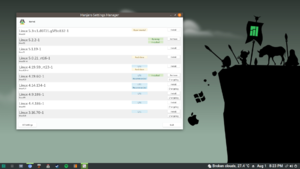AltTabbins
Fully [H]
- Joined
- Jul 29, 2005
- Messages
- 20,387
I just got an intel AX200 to replace the killer wireless nic in my XPS 15. I dropped it in and booted into Pop Os to find there wasn’t a driver. No big deal though, I looked into the documentation and Intel says they will support it in kernel 5.1. I grab the .deb’s from Ubuntu’s site and install them. The header throws errors and I can’t fix them. I purged and tried 3 different versions with no luck. Finally figure I’d do it the lazy way and added the repo for ukuu. Tried to install it and it can’t find the package. Turns out the dev switched it to a paid license model. After more research I found I could install an old version through snap for free. Get that done, purge all my old failed kernel installs, and install 5.1.9. Reboot and nothing. No WiFi. Go back and look some more to find out that intel hasn’t supported it when they said they would. No big deal, tossed my killer back in and I’m good to go.
But it got me thinking. What’s your preferred way to update your kernel? Or do you even bother? I usually just stick with the stable release that comes with a distro but I tend to buy hardware before it’s well supported in Linux. Do you like ukuu? Do you just grab the files and do it in terminal? Is there a better way that I don’t know about yet?
But it got me thinking. What’s your preferred way to update your kernel? Or do you even bother? I usually just stick with the stable release that comes with a distro but I tend to buy hardware before it’s well supported in Linux. Do you like ukuu? Do you just grab the files and do it in terminal? Is there a better way that I don’t know about yet?
![[H]ard|Forum](/styles/hardforum/xenforo/logo_dark.png)
